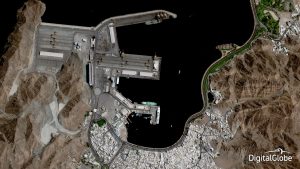
The Sultanate of Oman has announced that it intends to build two satellites and then have them launched by the end of 2019, according to the Omani minister of transport and communications, Dr. Ahmed bin Mohammed bin Salim al Futaisi.
One of these satellites is a Cubesat designed to measure light pollution and is being built by the Omani Astronomical Society (OAS). Dr. Saleh bin Said Al Sheithani, President of the OAS, said, “When there is too much light, say in the city, there are hardly any stars visible, maybe 20 or so. But if you go out to the desert where there is less or no light, you’ll able to spot thousands of stars. Light pollution is bad for the economy too, since a lot of money goes into making these lights, apart from the power consumption.” The Cubesat is believed to measure 10 x 10 x 10cm, and weigh 1.33 kilograms.
The nature of the second satellite is unknown, but it is understood that Oman is actively considering the development of its own satellite manufacturing capability as well as the acquisition of a large communications satellite as part of an overall effort to modernise its infrastructure. Dr. Al Futaisi said that in order to coordinate and facilitate its satellite and space efforts, the Omani government is considering the creation of a national entity, either an agency or a state-owned company.
Regarding Oman’s satellite communications needs, Dr. Al Futaisi remarked that initially Muscat was looking at contracting with a major international provider, but has since decided to create the infrastructure needed to build the system in Oman with the help of international expertise. It is thought that the project will be paid for by investment funds.
Unlike its other Gulf Cooperation Council (GCC) partners, Oman does not have the large cash reserves that make a satellite project readily affordable. As a result, for the government in Muscat to pursue these projects at a time when the national and regional economic outlook is uncertain at best suggests that these satellite projects, as part of a wider national telecommunications strategy, is seen as a means to boost and modernise critical infrastructure in Oman. In turn, it is hoped that this telecommunications modernisation will increase Oman’s economic capacity and prospects.
 SpaceWatch.Global An independent perspective on space
SpaceWatch.Global An independent perspective on space




